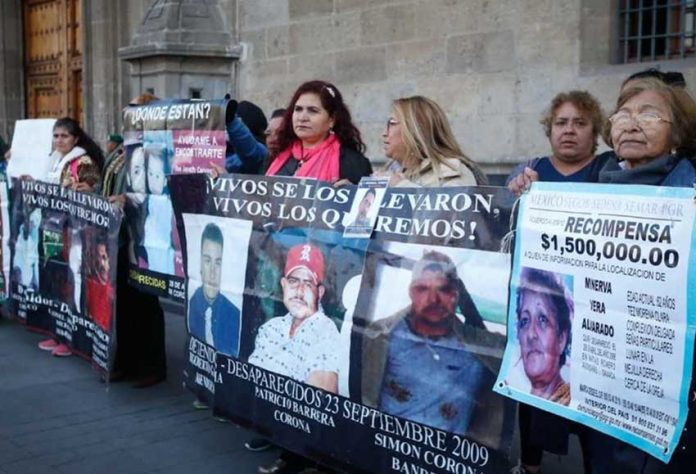Mexico is an “enormous hidden grave,” a federal official said today while presenting a 400-million-peso plan to fund search efforts for missing persons and to combat forced disappearances and kidnappings.
Speaking at the presidential press conference this morning, Alejandro Encinas, undersecretary for human rights, migration and population in the Secretariat of the Interior (Segob), said the plan would include a “real implementation” of the General Law on Forced Disappearances promulgated by past president Enrique Peña Nieto.
Encinas said that last year 468.9 million pesos (US $24.5 million) was allocated to the National Search Commission but only 6 million pesos was spent.
“That budget was only on paper,” he charged, adding that this year the full 400 million pesos will be used by the commission.
“The fundamental objective of this plan . . . is to design, with the participation of the family members of victims . . . the public policies and procedures . . . for the search, location and identification of missing persons . . . .”
It will also implement efforts to prevent the crimes, investigate them and punish those responsible, Encinas said.
“It’s estimated that there are currently 40,000 disappeared persons, more than 1,100 clandestine graves and around 26,000 unidentified bodies in morgues . . . that gives an account of the magnitude of the humanitarian crisis and the violation of human rights that we are confronting,” he said.
Encinas said that he will interview 11 candidates for the position of National Search Commission chief at public hearings this week and that by Friday an appointee will be named.
That official will oversee the government’s search efforts including the design and implementation of a national exhumation program and the forensic identification of victims, he said.
Encinas explained that the government is working with international organizations and the families of missing persons to draw up protocols for the investigation of forced disappearances, the search for disappeared persons, the exhumation of bodies and their identification.
The aim, he said, is to “develop a differentiated approach that allows us to better attack search tasks throughout the country’s entire territory, which unfortunately has become an enormous hidden grave.”
Encinas said that special attention will be given to the routes traveled by migrants through Mexico including those in the states of Chiapas, Oaxaca, Veracruz and Tamaulipas because between 8% and 10% of missing persons are Central Americans from the northern triangle countries of Guatemala, Honduras and El Salvador.
The undersecretary said the plan’s biggest challenge is to ensure that state-based search commissions are put into place in all 32 entities as so far only eight have been established.
“We have four [states] where there is already a decree that allows their formation but a person in charge hasn’t been named and in 20 [states], more than a year after the general law [on forced disappearances] was promulgated, they haven’t even taken legislative steps for the formation of state commissions, which is urgently needed,” Encinas said.
Source: Milenio (sp)
